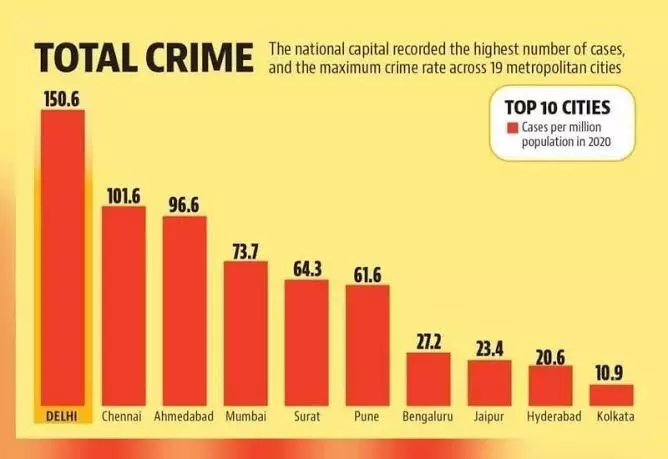Time to hold Nominated Head accountable amidst surging Crime Rate in National Capital
Delhi's rising crime rate & safety concerns demand action. Explore challenges, solutions & need for accountability in governance & law enforcement.;

What does it take to ignite a sense of urgency among those in power? When does the public start saying ‘we need a structural change’ instead of discussing issues case by case? In Delhi, the deteriorating law and order situation has become an urgent topic of discussion, with violent incidents making headlines almost daily. And they are still not national headlines because it’s a central government tender. Just last week, the murder of a doctor at a hospital sent chills through the community, raising critical questions about safety in a city that should be secure for its residents. As crime escalates, the ‘distant from common sense’ reality is that the Aam Aadmi Party’s (AAP) elected government finds itself in a position of helplessness, largely due to the control wielded by the Lieutenant Governor (LG).
“You know nothing, Jon Snow!” The truth is “Stark”: Delhi's law enforcement is directly managed by the LG, V. K. Saxena, who reports to the Ministry of Home Affairs. This unique structure means that while AAP’s government can voice concerns, it lacks the authority to enact meaningful change in law enforcement. The increasing instances of crime are not just statistics; they are reflections of a system that is failing its people. Delhi’s Fromer CM, Arvind Kejriwal, has expressed his frustration, stating that "law and order has collapsed," and labelling the situation as "jungle raj." His words echo the fears of a public that feels increasingly unsafe.
Looking at the recent murder of a Delhi police personnel, which is not an isolated event rather a sign of a deeper malaise within the city’s safety apparatus. If even Delhi Police cannot ensure their own safety, how can the common Delhiite feel secure? The political blame-game that follows these events only adds to the confusion. While the AAP government attempts to hold the LG accountable, the latter deflects responsibility, accusing the elected officials of politicising the issue.
The rising crime rate in Delhi is not just a failure of administration; it highlights a deeper, systemic issue that has persisted for too long. The recent shooting incident related to extortion has raised immense concerns about the effectiveness of the Delhi Police. With criminals feeling more empowered and public trust diminishing, it’s evident that the police force needs more than just good intentions; it requires resources, proper training, and a clear mandate to take action. However, with the police under the control of the LG, the AAP government finds itself with limited power.
This structural limitation prompts questions in my mind: Why isn’t the LG held accountable for the increasing crime? Who will ask him? Why does the Central Government seem to remain silent while Delhi faces these urgent challenges? The LG’s office, which oversees law enforcement, must not only recognise the rising crime rates but also take proactive steps to combat it. The onus for action lies upon them.
Additionally, the timing of these violent events aligns with political cycles, leading many to question the motivations behind the LG’s actions, or lack thereof. Are we seeing a pattern of selective inaction designed to undermine the elected government? While the AAP government may have restricted authority over law enforcement, it still has a role to play in the public safety narrative. They can voice concerns, push for reforms, and challenge the existing norms.
The public deserves more than mere political rhetoric; they deserve tangible action. As the situation deteriorates, the LG must take bold steps to rebuild trust in law enforcement. The BJP-led central government must learn this, I mean the Supreme Court just told their ‘caged parrots’ that the perception matters equally, in their recent ruling in Arvind Kejriwal’s bail. This involves not only addressing immediate issues but also creating long-term strategies for crime prevention and public safety. Collaboration between the LG and the elected government is crucial; they need to work together, not against each other, to confront this escalating crisis.
In the end, the deteriorating law and order situation in Delhi underscores a fundamental reality: without accountability and proactive governance, the safety of citizens will continue to be jeopardized.

